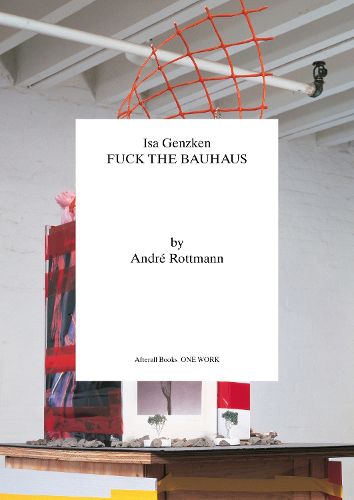Readings Newsletter
Become a Readings Member to make your shopping experience even easier.
Sign in or sign up for free!
You’re not far away from qualifying for FREE standard shipping within Australia
You’ve qualified for FREE standard shipping within Australia
The cart is loading…






A strikingly original analysis of Isa Genzken’s move towards merging sculptural and architectural morphologies into the critique of commodity culture.
Fuck the Bauhaus, made in the year 2000 out of quotidian objects and cheap materials foraged from New York City by the German artist Isa Genzken, marked a poetic and provocative departure from Genzken’s earlier work. Since the 1970s, Genzken’s post-Minimalist works had been like ruins in reverse, conjuring the haunting specters of recent catastrophe, destruction, and failure in the United States, while also playfully suggesting a degree of freedom and elevation.
Analyzing how this mode gave way to a new penchant for appropriation, collage, and montage, Andre Rottmann offers a strikingly original analysis of Genzken’s move towards merging sculptural and architectural morphologies into the critique of commodity culture. In this new addition to the One Work series, Rottmann draws on the writings of Deleuze and Guattari, Bruno Latour, and other contemporaneous theorists of assemblage to illuminate Genzken’s work as a powerful reimagination of social relations in flux.
$9.00 standard shipping within Australia
FREE standard shipping within Australia for orders over $100.00
Express & International shipping calculated at checkout
Stock availability can be subject to change without notice. We recommend calling the shop or contacting our online team to check availability of low stock items. Please see our Shopping Online page for more details.
A strikingly original analysis of Isa Genzken’s move towards merging sculptural and architectural morphologies into the critique of commodity culture.
Fuck the Bauhaus, made in the year 2000 out of quotidian objects and cheap materials foraged from New York City by the German artist Isa Genzken, marked a poetic and provocative departure from Genzken’s earlier work. Since the 1970s, Genzken’s post-Minimalist works had been like ruins in reverse, conjuring the haunting specters of recent catastrophe, destruction, and failure in the United States, while also playfully suggesting a degree of freedom and elevation.
Analyzing how this mode gave way to a new penchant for appropriation, collage, and montage, Andre Rottmann offers a strikingly original analysis of Genzken’s move towards merging sculptural and architectural morphologies into the critique of commodity culture. In this new addition to the One Work series, Rottmann draws on the writings of Deleuze and Guattari, Bruno Latour, and other contemporaneous theorists of assemblage to illuminate Genzken’s work as a powerful reimagination of social relations in flux.